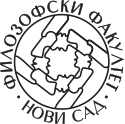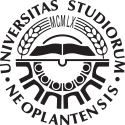15KKKK8 - Greek and Roman Lyrical Poetry
| Course specification | ||||
|---|---|---|---|---|
| Course title | Greek and Roman Lyrical Poetry | |||
| Acronym | 15KKKK8 | |||
| Study programme | Comparative Literature with Literature Theory | |||
| Module | ||||
| Type of study | first degree undergraduate academic studies | |||
| Lecturer (for classes) | ||||
| Lecturer/Associate (for practice) | ||||
| Lecturer/Associate (for OTC) | ||||
| ESPB | 5.0 | Status | ||
| Condition | Passed exam in Biblical Literature | Oblik uslovljenosti | ||
| The goal | Students learn about Greek and Latin poetry of the ancient period. They are introduced into the works of representative poets and taught how to recognize Greco-roman poetic relations, as well as the intertextual connections between the ancient and modern poets. | |||
| The outcome | Students are enabled to recognize and evaluate the artistic features of the Ancient Greek and Roman poetry on their own. | |||
| Contents | ||||
| Contents of lectures | The rise of lyric poetry and its relevance to the development of modern European poetry. Elegy (Callinus, Tyrtaeus, Solon, Mimnermus, Theognis); iambic verse (Archilochus, Semonides, Hipponax); eolic verse (Sappho, Alcaeus, Anacreon); melic; choral poetry (Alcman, Stesichorus, Ibycus, Simonides, Pindar). Influence of choral poetry in the development of tragedy. Green influences in Roman poetry: Lucretius, Catullus, Horace, Virgil, Propertius, Tibullus, Ovid. | |||
| Contents of exercises | Practices, comparative reading and discussing of literary texts. | |||
| Literature | ||||
| ||||
| Number of hours per week during the semester/trimester/year | ||||
| Lectures | Exercises | OTC | Study and Research | Other classes |
| 2 | 0 | |||
| Methods of teaching | monologic, dialogic, text method | |||
| Knowledge score (maximum points 100) | ||||
| Pre obligations | Points | Final exam | Points | |
| Activites during lectures | 20 | Test paper | 70 | |
| Practical lessons | 10 | Oral examination | ||
| Projects | ||||
| Colloquia | ||||
| Seminars | ||||

